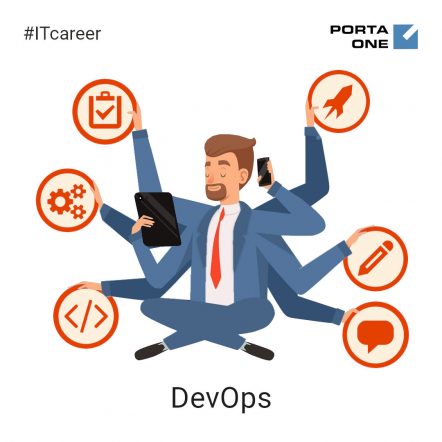DevOps is an abbreviation for development + operations. It’s a profession at the junction of development and system administration. A DevOps engineer deals with automation of the software lifecycle. But behind this short phrase there is a large set of duties and skills.
If you compare a software product/or an application to a train that needs to move forward (regularly updated, enriched with new features), then the DevOps engineer is the person who ensures this process. He makes sure that the train does not interfere with other trains on the same route and puts sleepers and rails in front of them – often at full speed.
His task is to increase predictability and safety, and also the efficiency of software development, so that each new update does not break what has been done before (or break anything), making the process as efficient and automated as possible.
DevOps is a versatile specialist who understands all stages of development, clarifies what difficulties may occur and how they can be prevented. No wonder that DevOps engineers are one of the most demanded (and expensive!) professions in the IT industry.
DevOps takes part in all stages of product development:
- In some companies, at the evaluation phase DevOps analyses why it is necessary to change the product
- At the design stage they define the requirements for the future infrastructure. Though sometimes a project manager might be responsible for this.
- During actual development and testing, these professionals install the product, support the development tools and test the product.
- During release, DevOps makes sure that known bugs are not passed on to the next stage so that everything integrates and works properly.
This is an approximate list of duties of a DevOps-engineer:
- Deployment of release in production;
- Integration and improvement of development processes;
- Standardization of development tools;
- Adjustment of infrastructure for the specifics of the developed software;
- Preparing the environment for frequent changes;
- Identifying and correcting problems;
- Automation of processes.
If DevOps is a profession at the junction of development and administration, it is not difficult to imagine the path to it. Sysadmins who mastered programming tools or developers who learned the intricacies of operation processes become DevOps engineers.
The most important soft skills for a DevOps engineer are analytical mindset and stress resilience. You have to deal with the causes of all kinds of errors and interact with a large number of people and departments.
Looking at the demand for DevOps engineers in IT market and beyond, the most obvious career path is horizontal development: improving knowledge and skills, expanding your own expertise. Besides, you can always go back to being an administrator, a developer or a test engineer, or you can be promoted to a project architect, IT security engineer or project manager.
If you see yourself as a DevOps engineer, you can start your career with the help of our courses – and enrich your knowledge in the field of development.




